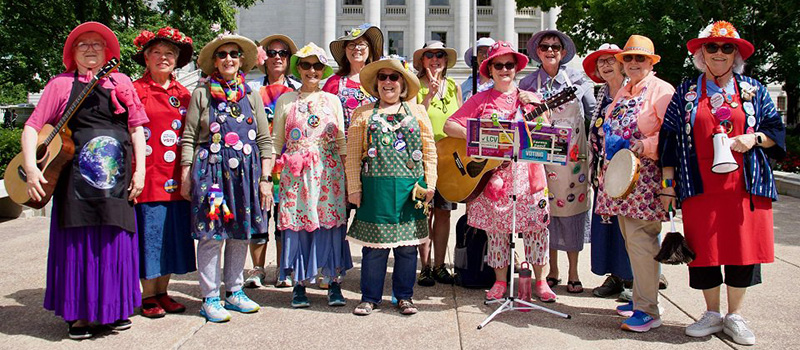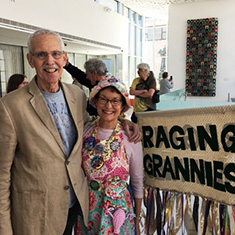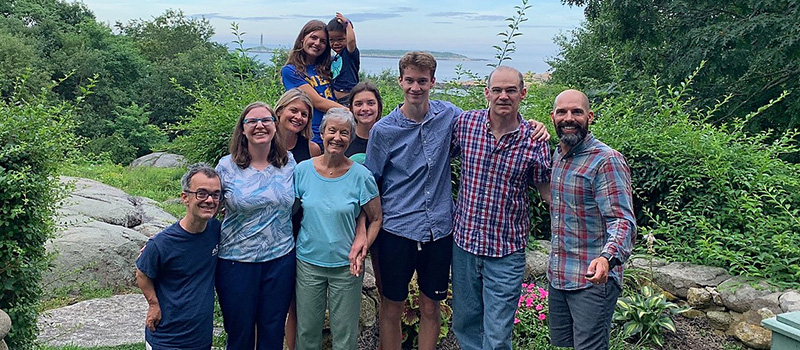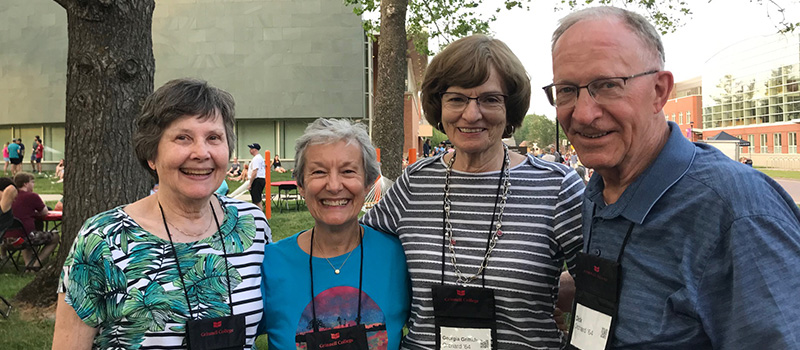Raging Grannies brings together 1964 alumna’s three greatest passions
January 22, 2025 — Barbara Beale Arnold ’64 comes from three generations of First Congregational United Church of Christ ministers, a denomination known for its leadership in social justice circles. And while she did not continue this career, it certainly has shaped how she moves in the world.
“I’ve done this ministry in my own ways,” Barbara explains.
And lately one of those ways has been to dress as a stereotypical old grandmother while singing at social justice events. Barbara is part of the Madison chapter of Raging Grannies. “I saw them sing at a Dane County fundraiser and was enchanted,” she explains. So, when two Raging Grannies friends asked her to join, she was intrigued.
 The Madison chapter of Raging Grannies poses for a group shot during an event last year.
The Madison chapter of Raging Grannies poses for a group shot during an event last year.
“I love play acting,” she says, but adds that singing is far from her forte. Yet as her friends explained, “Enthusiasm, message, and engagement with the audience exemplify the Grannies most important traits,” which resonated with Barbara.
Founded in 1987 in Victoria, British Columbia, the Raging Grannies is an international movement whose focus is “using creative and humorous protests for political education.” They challenge age and gender stereotypes, often dressing the part of the sweet old granny while simultaneously singing lyrics that are bold and sometimes bawdy.
The Madison chapter began in 2002, performing their own satirical songs that elevate issues around gender, the environment, and numerous other social concerns. They regularly perform at the Madison Farmers Market and social justice events and are easy to spot in their colorful “granny glam.” With 190 songs and counting, the group meets bi-weekly to create new lyrics, often sung to familiar folk and other popular music tunes. As they work together on songs, they must come to consensus on the lyrics, and Grannies also reserve the right to sit a song out if they prefer.
 Fred Arnold ’63 and
Fred Arnold ’63 and
Barbara Beale Arnold ’64
“Each chapter, called a gaggle, is autonomous, but we do share songs,” Barbara says. Gaggles currently exist in 30 states and all Canadian provinces, as well as four European Union countries. As she puts it, “We are raging, so we don’t hide in nooks and crannies.”
Barbara wasn’t hiding 60 years earlier, either. She and her husband, Frederick “Fred” Martin Arnold ’63 joined the Peace Corps in 1965, just a few years after the program started.
“We were young and idealistic and loved JFK,” she recalls. They were in one of the largest training cohorts destined for Malaysia. Volunteer teachers in this Muslim culture, the Arnolds mostly traveled on foot or via motorbike. “We grew to love and still miss the imam’s haunting call to prayer five times a day,” she recalls. “This cultural immersion awakened our consciousness of and sensitivity to another beautiful world religion.”
Upon their return to the U.S., after a brief stint in Illinois, the Arnolds moved to Madison, Wisconsin, where they raised three sons, in whom they took great pride. “I still learn from my sons every day,” Barbara says.
Their oldest, Erick Arnold ’90, is a lead attorney for the Bad River Band of the Lake Superior Chippewa; their middle son, Gary, works for the Illinois Disabilities Commission and is past president of the 8,000 member association Little People of America; their youngest, Stephen works in the private sector and “is one of the most ethical and constructive people I know,” Barbara says. She’s equally proud of her daughters-in-law and what she dubs “almost perfect” five grandchildren.
 Arnold and her family members take a photo while visiting Thatcher Island.
Arnold and her family members take a photo while visiting Thatcher Island.
The world of education has been a constant source of inspiration in Barbara’s life. “As an undergraduate, I learned how to think for myself and realized I could draft an argument on both sides of controversial issues,” she explains. “How liberating it was to comprehend that few issues have clear cut answers.”
At Grinnell, she also continued a lifelong passion for theatre, starring in strong female leads such as Grusha in The Caucasian Chalk Circle and Barbara in Major Barbara. These roles fueled her increasing social justice awareness. “They transformed my perception of what had been a pretty sheltered world,” she explains.
Both Barbara and Fred supported one another in their pursuit of master’s degrees in English and economics, respectively. Fred, who died in 2018, taught economics at Madison Area Technical College (now Madison College) for decades, and Barbara joined him there in 1987 as lead teacher in the English department. They developed a popular humanities-based leadership studies course, continuing to teach a similar class at Edgewood College once they retired in 2003. “What a fabulous experience both for the students and for us,” Barbara recalls.
Over her years in Madison, Barbara’s social justice mindset manifested in her immersion in myriad ways through local and state politics beginning with the Dane County League of Women Voters. She went on to be appointed to the Madison School Board where she served for nine years, including three as president. This was, as she describes, a “contentious and tumultuous” time, because it was during the integration of the Madison schools.
 Arnold is joined by classmates Ann Bacon May ’64, left, Georgia Griffith Orchard’64, and Dick Orchard ’64 at Reunion 2023.
Arnold is joined by classmates Ann Bacon May ’64, left, Georgia Griffith Orchard’64, and Dick Orchard ’64 at Reunion 2023.
Also serving on the Dane County Youth Commission for a decade, Barbara was chair for half of that tenure. In 2005, a handful of former school board presidents created GRUMPS (Grandparents United for Madison Public Schools) through which they sponsor brown bag lunches covering various educational topics including requests for advocacy on policies they find “abhorrent.”
Barbara’s longest political engagement spanned 50 years with the Madison Civics Club. Joining in 1973, she was chairperson in 1992-1993 during its heyday when there were 1,200 members with 500 on the waitlist. A highlight was having the famous actor and opera singer, Kitty Carlisle Hart, speak about the intergenerational, collaborative impact and necessity of the arts.
When the pandemic hit, the organization also took a hit in membership. “It had run its course,” Barbara explains, acknowledging the presence of other strong civic-minded organizations in the area to which the club dispersed its remaining funds.
She is enjoying her latest enterprise as a Raging Grannie. Beyond performances, Barbara’s gaggle provides friendship and life support in many ways, going out to dinner after rehearsals and socializing together in between. “Everyone is so kind and caring,” she says. They’ve been there for each other through illness and loss, and they sing at the services of Grannies who have died. “They even sang at Fred’s service,” Barbara recalls, explaining how spouses often become part of the community as “Granny Groupies.”
“For me, the Raging Grannies bring together in one package my three greatest passions: the love of play acting, my deeply embedded concern for the social gospel and social justice issues, and the critical importance of community in a country often too self-absorbed with individualism,” Barbara says.
—by Melanie Drake ’92